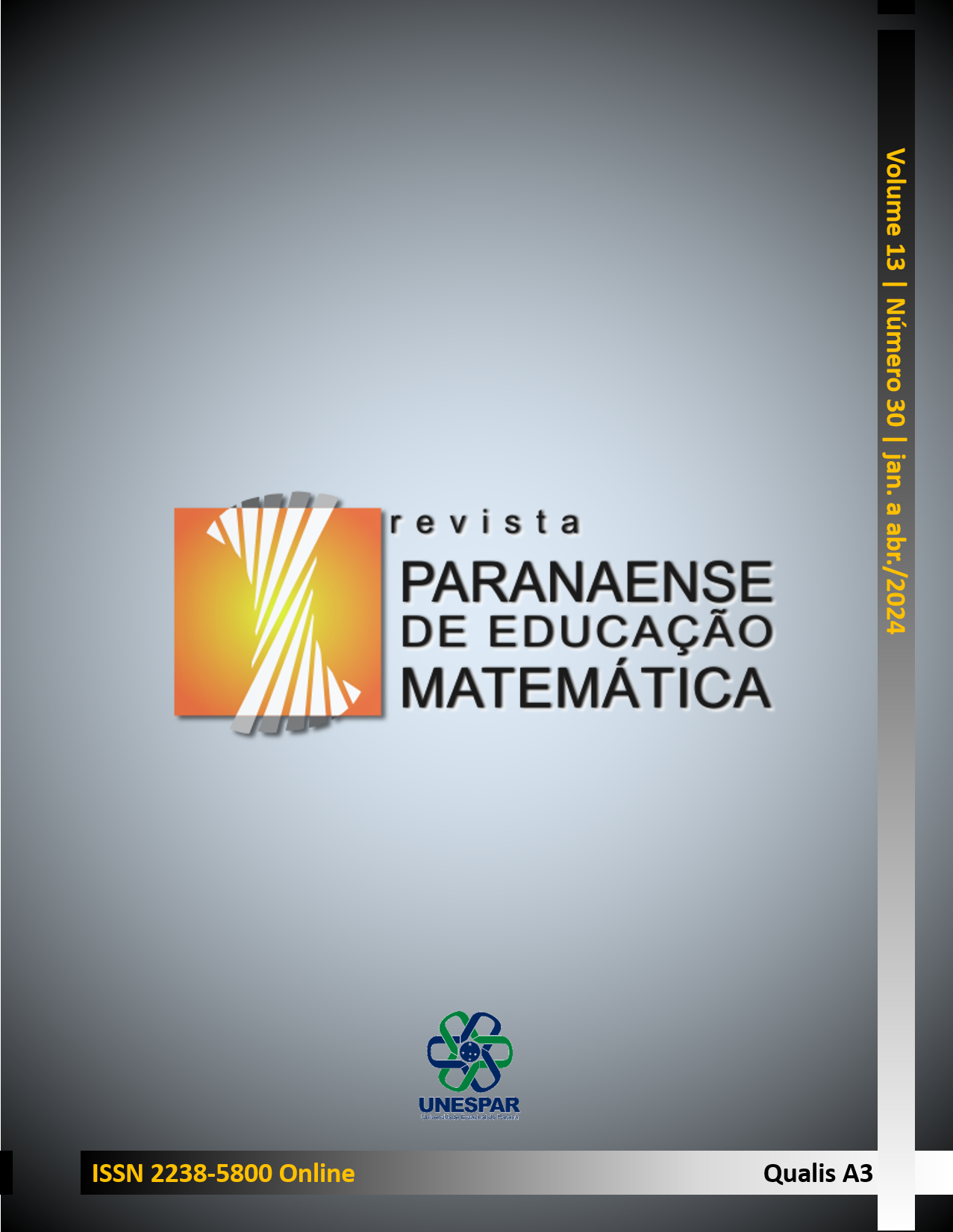Pensamento Algébrico no 5° ano do Ensino Fundamental
explorando uma tarefa de valor omisso
DOI:
https://doi.org/10.33871/22385800.2024.13.30.165-186Resumen
Este artigo tem por objetivo caracterizar o pensamento algébrico revelado por estudantes do 5° ano ao resolverem uma tarefa de valor omisso. Na literatura não existe um consenso sobre o pensar algebricamente porém existem três perspectivas distintas, tal como especificam Almeida e Câmara. Em sintonia optamos pela mais contemporânea, a Teoria da Objetivação, alinhando-a à nova argumentação apresentada na Base Nacional Comum Curricular. Nesta perspectiva, existem três elementos interligados que caracteriza esse pensamento algébrico: a indeterminação, denotação e a analiticidade. Para o desenvolvimento da pesquisa recorremos aos aspectos metodológicos da atividade de ensino-aprendizagem a partir da Teoria da Objetivação e a análise multimodal descrita por Arzarello. Propomos uma tarefa de valor omisso contendo seis problemas com grau de dificuldade crescente a duas estudantes do 5° ano do Ensino Fundamental. Todo o nosso material para análise foi desenvolvido por elas na atividade de ensino-aprendizagem recorrendo aos distintos recursos semióticos para representar as discussões. Portanto, foi fundamental gravar todas as interações com o auxílio de aparelhos eletrônicos. Por fim, fizemos uso da análise multimodal de modo a nos debruçarmos sobre os vídeos, áudios e registros escritos realizados, identificando que as estudantes pensaram algebricamente diante da tarefa proposta.
Descargas
Citas
ALMEIDA, J. R. de; CÂMARA, M. dos S. Pensamento algébrico: em busca de uma definição. RPEM: Campo Mourão - PR, v. 6, n. 10, p. 34 - 60, 2017. Disponível em: http://rpem.unespar.edu.br/index.php/rpem/article/download/1124/972. Acesso em 19 dez. 2020.
ARZARELLO, F. Semiosis as a multimodal process. Revista Latinoamericana de Investigación en Matemática Educativa, Special Issue on Semiotics, Culture, and Mathematical Thinking (editores invitados: L. Radford y B. D’Amore), 2006, p. 267-299.
BOGDAN, R. C.; BIKLEN, S. K. Investigação qualitativa em Educação: uma introdução à teoria e aos métodos. Porto: Porto Editora, 1994.
BURGOS, M.; GODINO, J. D. Emergencia de razonamiento proto-algebraico en tareas de proporcionalidade en estudiantes de primaria. Educación Matemática, México, v. 31, n. 3, dez. 2019. Disponível: Emergencia de razonamiento proto-algebraico en tareas de proporcionalidad en estudiantes de primaria (scielo.org.mx). Acesso em: 1 jan. 2021.
BRASIL. Base Nacional Comum Curricular. Brasília, 2018. Disponível em: BNCC_EI_EF_110518_versaofinal_site.pdf (mec.gov.br). Acesso em: 29 dez. 2020.
FERREIRA, M. C. N.; RIBEIRO, A. J.; RIBEIRO, M. Álgebra nos anos iniciais do ensino fundamental: investigando a compreensão de professores acerca do pensamento algébrico. Revista Educação Matemática, Mato Grosso do Sul, v. 11, n. 25, 2018.
FERREIRA, M. C. N.; RIBEIRO, A. J.; RIBEIRO, M. Álgebra nos anos iniciais do ensino fundamental: primeiras reflexões á luz de uma revisão de literatura. Educação e Fronteiras On-Line, Dourados – MS, v. 6, n. 17, p. 34-47, 2016.
GOMES, L. P. da S. Introdução à álgebra nos anos iniciais do Ensino Fundamental: uma análise a partir da Teoria da Objetivação. 2020. 182 f. Tese (Doutorado em Educação) - Universidade Federal do Rio Grande do Norte, Natal.
LESH, R.; POST, T.; BEHR, M. Raciocínio proporcional. In: HIEBERT, J.; BEHR, M. (Eds.). Number Concepts and operations in the Middle grandes. Tradução de Ana Isabel Silvestre, p. 93-118, 1988.
LIMA, J. R. de C. Mapeamento de trabalhos sobre o pensamento algébrico nos anos iniciais apresentados nos ENEM (1998-2013). In: XIII ENCONTRO NACIONAL DE EDUCAÇÃO MATEMÁTICA. 2016, São Paulo - SP. Anais [...]. Disponível em: http://www.sbem.com.br/enem2016/anais/pdf/7327_4156_ID.pdf. Acesso em: 10 mar. 2021.
LINS, R.C.; GIMENEZ, J. Perspectivas em aritmética e álgebra para século XXI, Campinas, SP: Papirus, 2001.
XXXXXX. O pensamento algébrico no 5° ano do ensino fundamental: explorando tarefas de valor omisso. 2022. 124f. Dissertação (Mestrado em Educação Matemática e Tecnológica), Universidade Federal de Pernambuco, 2022.
RADFORD, L. Pensamento algébrico nos anos iniciais: diálogos e complementaridades entre a teoria da objetivação e a teoria histórico-cultural. MORETTI, V. D.; RADFORD, L (org). São Paulo: Editora Livraria da Física, 2021.
RADFORD, L.; SABENA, C. The question of method in a Vygotskian semiotic approach. In: Approaches to qualitative research in mathematics education. Springer, Dordrecht, 2015. p. 157-182.
RADFORD, L. Semiótica y educación matemática. Revista Latinoamericana de Investigación en Matemática Educativa, Special Issue on Semiotics, Culture and Mathematical Thinking, 2006, p. 7-21. Disponível em: http//luisradford.ca. Acesso em 28 jan. 2021.
RADFORD, L. Signs, gestures, meanings: Algebraic thinking from a cultural semiotic perspective. Lyon, França, 2009.
RADFORD, L. The Emergence of Symbolic Algebraic Thinking in Primary School. In: KIERAN, C. (Ed.). Teaching and learning algebraic thinking with 5- to 12-year-olds: the global evolution of an emerging field of research and practice. New York: Springer, p. 3-25, 2018.
RADFORD, L. The progressive development of early embodied algebraic thinking. Mathematics Education Research Group of Australasia, p. 257-277, 2013. Disponível em: http//luisradford.ca. Acesso em 03 mar. 2021.
RADFORD, L. Um recorrido a través de la teoria de objetivación. In: GOBARA, S. T.; RADFORD, L. (org.). Teoria da Objetivação: Fundamentos e aplicações para o ensino e aprendizagem de ciências e matemática. São Paulo: Editora Livraria da Física, 2020.
RADFORD, Luís. Algebraic thinking from a cultural semiotic perspective. Research in Mathematics Education. v. 12, n. 1, 2010.
SANTOS, F. C. F.; MORETTI, V. D. O pensamento algébrico de professores dos anos iniciais: desenvolvimento do pensamento algébrico com a mediação de conceitos da álgebra. In: MORETTI, V. D.; RADFORD, L. (org.). Pensamento algébrico nos anos iniciais: diálogos e complementaridades entre a teoria da objetivação e a teoria histórico-cultural. São Paulo: Editora Livraria da Física, 2021.
RADFORD, L. The Progressive Development of Early Embodied Algebraic Thinking. Math Ed Res J. 2014. Disponível em: http//luisradford.ca. Acesso em 10 jan. 2021.
TINOCO, L. A. de A.; PORTELA, G. M. Q.; SILVA, M. P. da C. A proporcionalidade e o pensamento algébrico. In: X ENCONTRO NACIONAL DE EDUCAÇÃO MATEMÁTICA, 2010, Salvador – BA.
VIANA, O. A.; MIRANDA, J. A. O raciocínio proporcional e as estratégias de resolução de problemas de valor omisso e de comparação. REVEMAT, Florianópolis, v. 11, n.1, p-194-213, 2016.
VERGEL, Rodolfo; ROJAS, Pedro Javier. Álgebra escolar y pensamento algebraico: aportes para el trabajo em el aula. Bogotá: Editora Universidad Distrital Francisco José de Caldas, 2018.
VERGEL, R. Formas de pensamiento algebraico temprano em alunos de cuarto y quinto grados de Educación Básica Primaria (9-10 años). 2014. 335 f. Tese (Doutorado em Educação). Universidad Distrital Francisco José Caldas. Bogotá.
VERGEL, R. Como emerge el pensamento algebraico? Revista de Didáctica de las Matemáticas, n. 68, p. 9-17, 2015
Descargas
Publicado
Cómo citar
Número
Sección
Licencia
Derechos de autor 2024 Revista Paranaense de Educação Matemática

Esta obra está bajo una licencia internacional Creative Commons Atribución-NoComercial-SinDerivadas 4.0.










